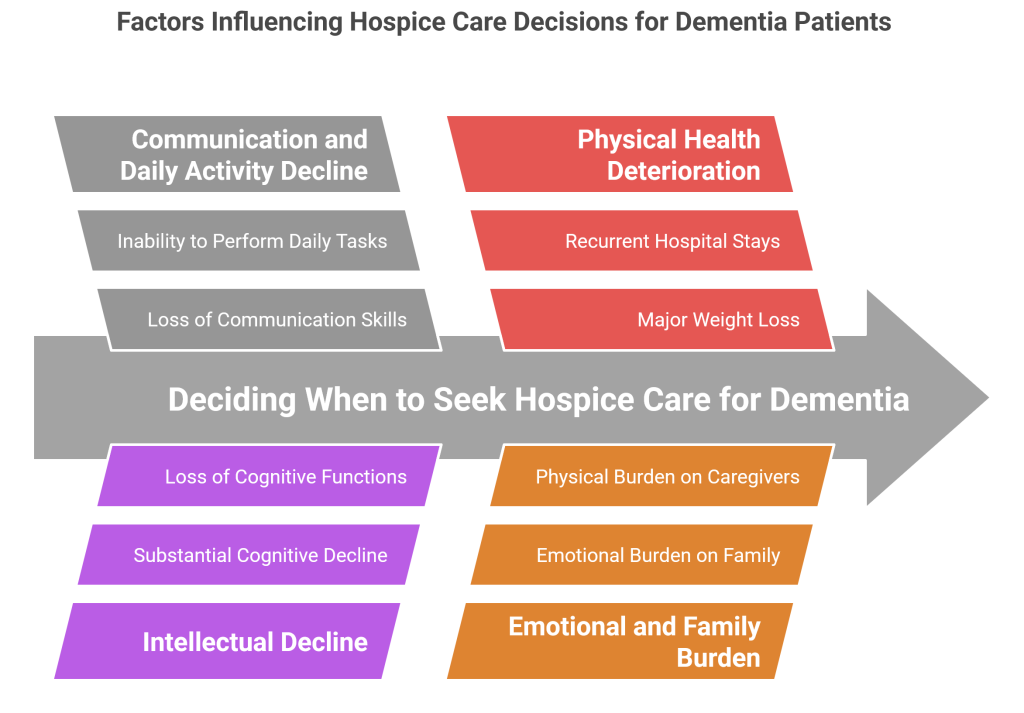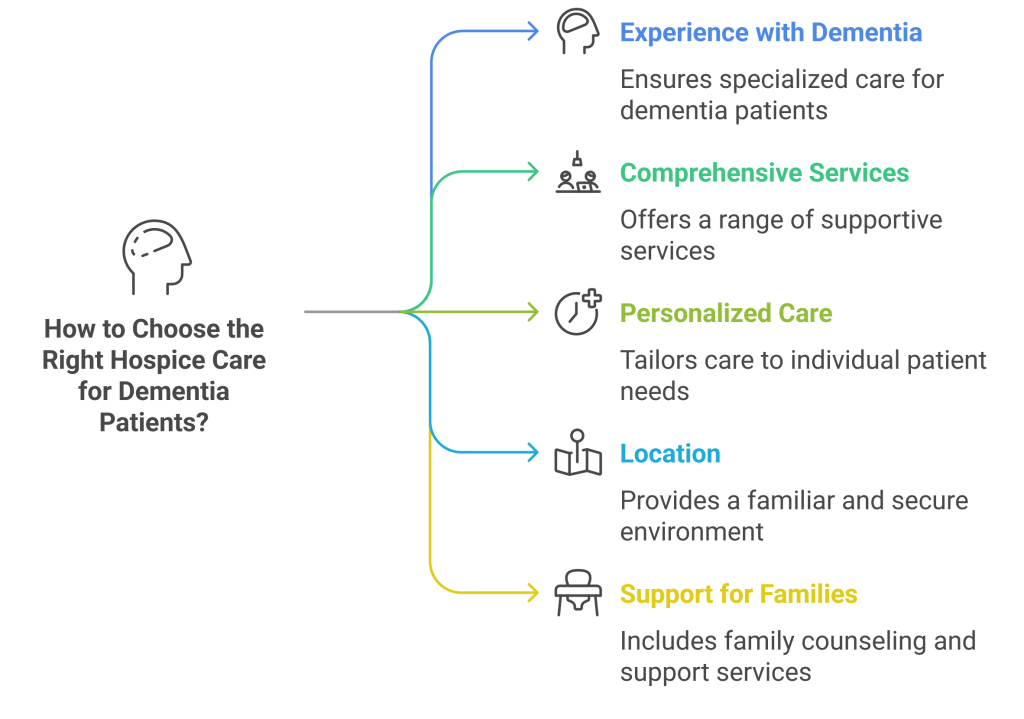Your loved one with Dementia may develop difficulty executing tasks for maintaining comfort and quality of life during the disease progression. The disease not only complicates managing disruptive psychological symptoms but also leads to physical and behavioral challenges. Hospice for dementia patients delivers essential care services to support families in providing dignified and peaceful end-of-life care to seniors.
The main focus of hospice medical treatment involves treating patient symptoms, delivering comfort while caring for physical and emotional requirements, and supporting family members through their end-of-life experiences.
This article explains hospice care practices for dementia patients as well as their advantages while discussing selection strategies for appropriate care.
What is Hospice Care for Dementia?
Hospice care for individuals with advanced dementia focuses on providing specialized support during the end-of-life stage, distinct from standard medical care.
While traditional medical care primarily targets the disease itself, hospice emphasizes enhancing comfort and quality of life for patients. The dementia hospice care system offers comprehensive support that addresses not only the physical but also the emotional and spiritual needs of both patients and their families.
Hospice care teams, consisting of physicians, nurses, social workers, and trained volunteers, deliver personalized care to dementia patients. Their goal is to alleviate pain, reduce distressing symptoms, and provide comfort during the patient’s final stages of life.
When to Seek Hospice Care for a Senior with Dementia?
Choosing hospice service remains an important yet difficult choice for patients with Dementia as well as their families. Most hospice care interventions begin when dementia treatment yields negative results during its later stages. As mobility and the ability to perform daily tasks decline, it becomes increasingly necessary to consider hospice care as symptoms worsen. Here are some of the reasons why a senior with Dementia seeks hospice care:
- Dementia patients start hospice care when they no longer maintain effective communication skills and fail to carry out daily activities.
- The requirement for hospice for Dementia arises whenever patients show substantial intellectual decline from Dementia.
- The variable timeline of a six-month life expectancy serves as a criterion to determine whether hospice support would be beneficial.
- In addition, the signs include recurrent hospital stays, major weight reduction, and poor physical abilities.
- Choosing hospice care represents a difficult choice that provides comfort along with care for both patients and their medical caregivers.
- Through hospice care, dementia patients, as well as their families, experience decreased emotional and physical burden.
How Does Hospice Care Ensure Dignity and Peace for Your Loved One?
A hospice for dementia care emphasizes honor and comfort more since they are crucial aspects of end-of-life care. The dementia progression means that the patients are unable to fully articulate their needs or how they want to be treated. The hospice organizations rely on care and humanity by offering pain-relieving care to the patients, accompanying them emotionally, and offering a serene environment to reduce the chances of cognitive decline. The aspects of the hospice for Dementia are as follows: Several benefits will accrue from the needs of the individuals in patient care settings, as well as their families. These include:
Pain and Symptom Management
Hospice care dedicates its efforts to control and decrease pain along with distress during the final dementia stages. The expertise of hospice professionals permits them to reduce symptoms that cause discomfort and agitation, thereby enabling patients to experience comfort.
Emotional Support
Dementia patients develop confusion together with fear and anxiety, which intensify during their final life stages. The systematic support from hospice teams extends to patients as well as family members through efforts that address the emotional hardship of dementia symptoms.
Spiritual Support
Spiritual counseling through hospice care is available to anyone who needs such support. Hospice offers spiritual guidance that aids patients and families in their journey towards facing death.
Family Support and Respite
Hospice care offers essential respite for family caregivers, who often experience significant stress that can impact their own health. By providing these caregivers with breaks, hospice services help alleviate the strain of caregiving. This respite allows family members to rest and recharge, reducing the negative effects of caregiving and supporting their well-being.
End-of-Life Planning
The hospice care team works closely with families to develop life-support strategies, guiding them through treatment decisions as well as dietary and medical needs for the end of life. This support helps reduce uncertainties and alleviates anxiety, allowing both patients and their families to navigate difficult decisions with greater ease and confidence.
Focus on Quality of Life
The main activity of hospice centers is enhancing the quality of life for those who have advanced Dementia. Hospice for Dementia provides comfort, support, and dignity maintenance as its main focus, while it does not pursue a cure.
How to Choose the Right Hospice Care for Dementia Patients?
Picking the right hospice service for dementia treatment needs a thorough examination. One should consider multiple essential elements when making this decision.
- Experience with Dementia: Most hospice care centers do not have dementia-specific care. Make sure the one you choose has experienced professionals who know how to care for dementia patients.
- Comprehensive Services: Another vital component of a reliable hospice care should include nursing care and pain control, as well as emotional support, spiritual assistance, and family counseling.
- Personalized Care: Hospice service providers should fulfill the individual healthcare demands of each patient. Hospice staff members need to present their care plans while clarifying the approaches for managing symptoms along with the personal preferences of each patient.
- Location: Choose the location of the hospice care center according to the patient’s home environment, facilities, and nursing homes for placement. It is crucial to choose the most suitable area for dementia patients because familiar environments create a sense of security for their patients.
- Support for Families: Your priority should be a hospice care center that includes family counseling services alongside education support and temporary family care services. Support from families emerges as crucial at end-of-life because emotional burdens prove too difficult to handle during this time. Loving care and respect for their loved ones are vital for the final days.
Conclusion
End-of-life care for dementia takes a holistic approach. It offers gentle treatment to seniors that prioritizes their comfort and dignity. The hospice team ensures providing comprehensive support, and care for both the patient and their family throughout this challenging time. Choosing high-quality hospice for Dementia care allows family members to offer their loved ones the best possible care during their final phase, with a focus on love, respect, and compassion.
Contact Monarch Gardens Memory Care Community today to help you and your loved ones every step of the way!







